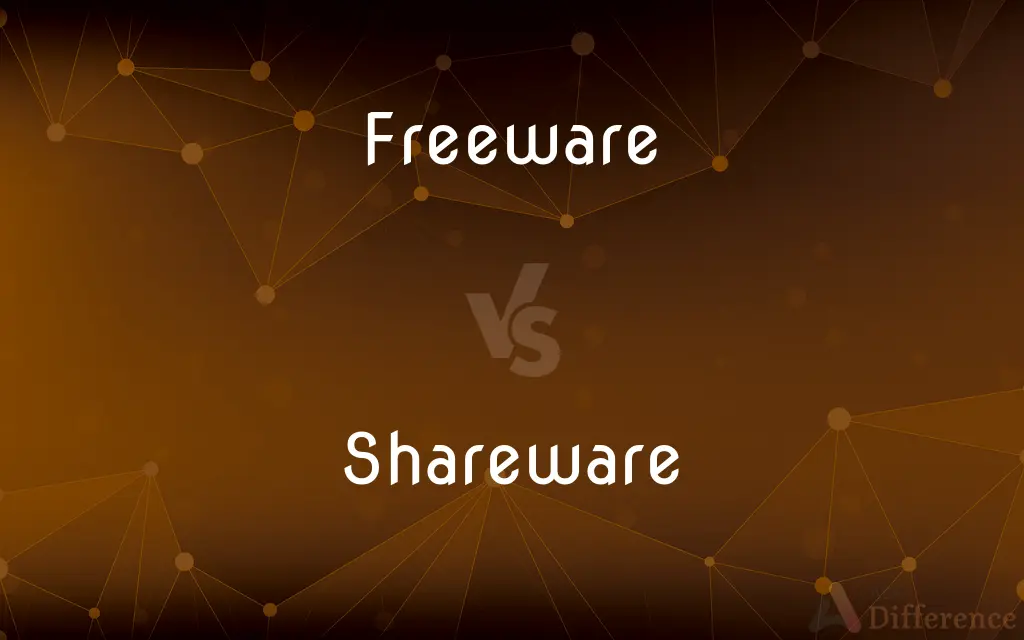Freeware vs. Shareware — What's the Difference?
Edited by Tayyaba Rehman — By Urooj Arif — Updated on May 14, 2024
Freeware is software available at no cost with unrestricted usage rights, whereas shareware offers limited free use before purchase is required.

Difference Between Freeware and Shareware
Table of Contents
ADVERTISEMENT
Key Differences
Freeware allows users to access and use the software without any financial cost, providing full functionality from the moment of download. On the other hand, shareware typically operates as a trial version with limited time or features, encouraging users to purchase the full version after the trial expires.
While freeware is often distributed without an expectation of payment, shareware uses its initial free distribution as a marketing strategy to first demonstrate value to the user before requesting payment. This strategy can effectively convert users into paying customers if the software proves useful.
Users of freeware are not typically required to register or provide personal information, which can appeal to those wary of sharing data. In contrast, shareware often requires user registration to track the trial period or unlock additional features.
Freeware may lack formal customer support or regular updates since there is no revenue generated directly from users. Whereas, shareware developers, incentivized by potential sales, may offer more robust support and frequent updates.
The development community around freeware can be more open and collaborative, with some freeware being open source. Shareware, however, is usually proprietary, with its source code kept inaccessible to maintain its commercial value.
ADVERTISEMENT
Comparison Chart
Cost
Free
Free initially, then requires purchase
Usage Limitations
No limitations
Time-limited, feature-limited, or both
Type of Distribution
Often open source or community-driven
Commercially driven, proprietary
User Registration
Not required
Often required to unlock features or extend
Support and Updates
Limited or community-supported
More structured, often prioritized
Compare with Definitions
Freeware
A type of software that is available at no cost and without any time limitations.
Mozilla Firefox is a popular freeware internet browser.
Shareware
Software that is free to use initially under certain conditions but requires payment for full functionality.
WinRAR operates as shareware, reminding users to purchase after the trial.
Freeware
Rarely includes advertisements or commercial promotions within the application.
Freeware tools typically provide a clean, ad-free user experience.
Shareware
Sometimes transitions to freeware after a new version is released.
Older versions of some software are turned into shareware once updated versions are available.
Freeware
Sometimes supports optional donations to sustain development.
Donation buttons are common on freeware download pages.
Shareware
Often includes built-in mechanisms to encourage purchase after the trial.
Shareware often has pop-up reminders for registration.
Freeware
Often used for promoting a brand or a developer's portfolio without direct revenue.
Many useful utilities for system management are available as freeware.
Shareware
Encourages trial use before buying to increase user confidence.
Most shareware provides a trial period to test features.
Freeware
Can be distributed by individuals or large corporations alike.
Adobe offers its Adobe Acrobat Reader as freeware.
Shareware
Typically offers customer support and regular updates during the trial and after purchase.
Shareware products often have dedicated support teams.
Freeware
Freeware is software, most often proprietary, that is distributed at no monetary cost to the end user. There is no agreed-upon set of rights, license, or EULA that defines freeware unambiguously; every publisher defines its own rules for the freeware it offers.
Shareware
Shareware is a type of proprietary software which is initially shared by the owner for trial use at little or no cost with usually limited functionality or incomplete documentation but which can be upgraded upon payment. Shareware is often offered as a download from a website or on a compact disc included with a magazine.
Freeware
Software that is available for free, usually over the internet.
Shareware
Copyrighted software that is available free of charge on a trial basis, usually with the condition that users pay a fee for continued use and support.
Freeware
(software) Complete and functional software that does not require payment or other compensation (such as viewing advertising) for its use. Freeware may be a proprietary license with no access to the source code.
Shareware
(software) A type of software that is distributed without payment but is limited in any combination of functionality, availability, or convenience.
Freeware
Software that is provided without charge
Shareware
Software that is available free of charge; may be distributed for evaluation with a fee requested for additional features or a manual etc.
Common Curiosities
Is shareware safe to download and use?
Shareware is generally safe to download and use, though it's recommended to download from reputable sources to avoid malware.
How does shareware work?
Shareware is initially free to use but requires payment for full access or continued use after a trial period.
Why do developers choose to create freeware?
Developers may create freeware to build reputation, share their creations widely, or support the community, without the direct aim of profit.
Are updates typically available for freeware?
Updates for freeware may be less frequent or dependent on community support, unlike commercially funded shareware which often has regular updates.
Can freeware be used for commercial purposes?
Yes, most freeware can be used for both personal and commercial purposes, but it's important to check the specific license agreement.
What is freeware?
Freeware is software that's offered at no cost, allowing unrestricted use without any financial obligations.
What are the typical restrictions found in shareware?
Common restrictions include time limits, feature locks, and usage tracking to enforce eventual purchase.
How can I tell if a piece of software is freeware or shareware?
Check the software's license or documentation; it should clearly state whether it's freeware or shareware, including any associated costs or limitations.
What incentives do developers have to offer shareware?
Offering shareware allows developers to attract users by letting them try the product before buying, potentially leading to more sales and feedback for improvement.
Can shareware become freeware?
Yes, developers sometimes transition their shareware to freeware, typically when newer versions are released or if they decide to stop commercial operations.
How do freeware and shareware differ in terms of legal use?
Both types of software have legal usage terms defined by their licenses, but freeware generally has fewer restrictions compared to the often conditional usage terms of shareware.
Share Your Discovery

Previous Comparison
Parachuting vs. Paragliding
Next Comparison
Aspiration vs. GoalAuthor Spotlight
Written by
Urooj ArifUrooj is a skilled content writer at Ask Difference, known for her exceptional ability to simplify complex topics into engaging and informative content. With a passion for research and a flair for clear, concise writing, she consistently delivers articles that resonate with our diverse audience.
Edited by
Tayyaba RehmanTayyaba Rehman is a distinguished writer, currently serving as a primary contributor to askdifference.com. As a researcher in semantics and etymology, Tayyaba's passion for the complexity of languages and their distinctions has found a perfect home on the platform. Tayyaba delves into the intricacies of language, distinguishing between commonly confused words and phrases, thereby providing clarity for readers worldwide.
















































